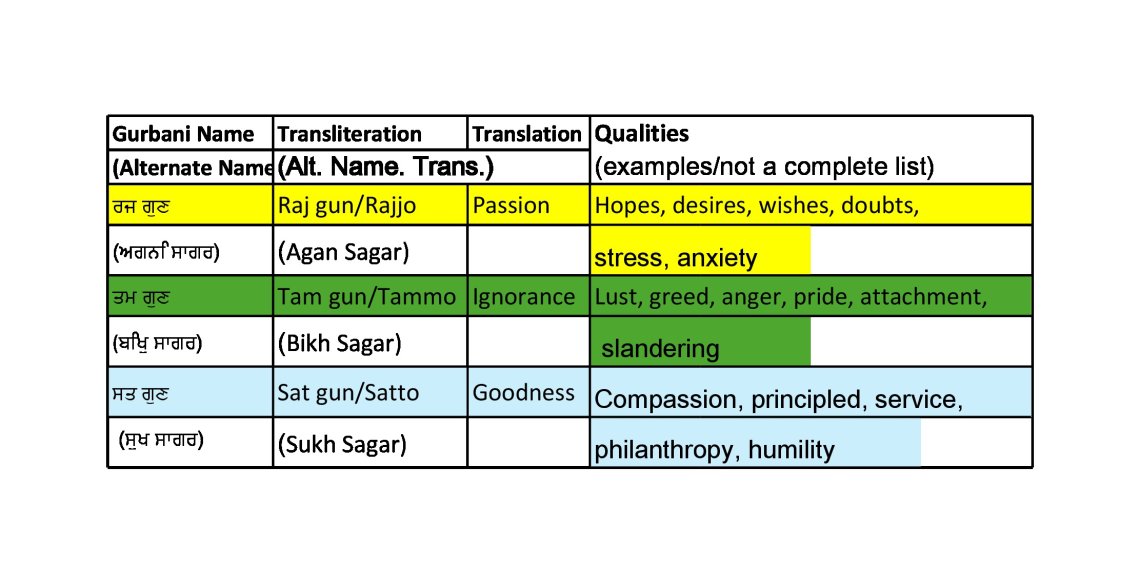Introduction
The famous saying of philosopher Rene Descrates says, “I think, therefore I am.,” proves that the very act of thinking makes us human. But Gurbani has penned another aspect of this stark reality of the human thinking processes in these words:
ਮਾਈ ਮਨੁ ਮੇਰੋ ਬਸਿ ਨਾਹਿ ॥ ਨਿਸ ਬਾਸੁਰ ਬਿਖਿਅਨ ਕਉ ਧਾਵਤ ਕਿਹਿ ਬਿਧਿ ਰੋਕਉ ਤਾਹਿ ॥੧॥ ਰਹਾਉ ॥
Maiee mun mero bas naeh. Nis baasur bikhian kau dhaavat keh bidh rokau taeh ||1|| Rahaau || (SGGS, Pg. No. 632)
Translation: O mother, my mind is out of control. Night and day, it runs after the material world. How can I restrain it? ||1||Pause||
The characteristics of material world are that first they attract, yet fleeting, fickle, constantly changing and never satisfying. So, what are the qualities of material world that are enticing to the mind?
Qualities of Material World
Gurbani has characterized three operating characteristics of material world as:
ਤ੍ਰਿਹੁ ਗੁਣ ਬੰਧੀ ਦੇਹੁਰੀ ਜੋ ਆਇਆ ਜਗਿ ਸੋ ਖੇਲੁ ॥
Trihau gun bandhee dehuree jo aaiaa jug so khel. (SGGS, Pg. No. 21)
Translation: The three qualities of Maya hold the body in bondage; whoever comes into the world is subject to their play.
The three qualities have been defined as:
Gurbani has many quotes where these three have been further elaborated and their influence explored. One example where the three characteristics of Maya have been defined is:
ਰਜ ਗੁਣ ਤਮ ਗੁਣ ਸਤ ਗੁਣ ਕਹੀਐ ਇਹ ਤੇਰੀ ਸਭ ਮਾਇਆ ॥
Raj gun tam gun sat gun kaheeai ih teri sabh maya. (SGGS, Pg. No. 1123)
Translation: (O God) Raajas, Taamas, and Saatav modes are the creations of Your Maya (illusion).
Mind’s Fickle Nature
According to science, human mind have about 60,000 to 70,000 thoughts in a day, making it very fickle in nature. Out of this range, 70 percent are negative, and 90 percent are same as the day before. Thus, very nature of mind is not being present in the now, but to dwell in the past or worry about future. The scientific world has coined a name for the wandering nature by calling it “exquisite time-traveling masters.” No wonder Gurbani has put this fickle aspect of mind in these words:
ਮਨੁ ਚੰਚਲੁ ਧਾਵਤੁ ਫੁਨਿ ਧਾਵੈ ॥
Mun chanchal dhaavat phun dhaavai || (SGGS, Pg. No. 222)
Translation: My fickle mind continuously running after fleeting things.
The nature of the fickle mind is to wander around with thoughts that are negative, repetitive, and ruinous as well, putting us in a loop of paralysis of endless options. There is a beautiful story from Guru Nanak Dev Ji’s life, which elaborates what the problem of the mind is. This event took place in 1497, during Guru Ji’s period of employment with Nawab Daulat Khan Lodhi, in Sultanpur. One day, Guru Ji went in River Bein for his early morning bath but did not return. Bhai Mardana waited for a long time and finally returned home alone. He duly informed Guru Ji’s employer Nawab Daulat Khan, and the parents were informed about Guru Ji’s disappearance.
Guru Ji had spent three days in a secluded place contemplating how to spread the message of living with Divine Virtues to the people. On the third day someone saw Guru Ji sitting at the graveyard. Guru Ji was heard saying, “There is no Hindu or Muslim.” Guru Ji ‘s message was about Oneness of humankind. Soon the news reached nawab and messengers were sent to bring Guru Ji to the palace. Nawab asked Guru Ji if there are no faith differences, and everyone is God’s creation that he should be OK to perform Namaz (Muslim prayer) in the mosque with him. Guru Ji accepted the invitation, and all proceeded to the mosque.
At the mosque, Qazi led the prayers and Nawab joined in. After the prayers, Nawab asked Guru Nanak why he did not join in the prayers? Guru Ji replied, “Dear Nawab, whom would have joined in the prayer? Your mind was in Kandahar (Afghanistan) purchasing horses, while your body was here.” The Nawab said, “Nanak, if my mind was not present in the prayer, you should have joined the Qazi.” Guru Ji said, “The Qazi’s mind was looking after the newly born colt at home.” Qazi admitted that his mind was with the colt as pointed out by Guru Ji. Guru Ji in his first sermon thus demonstrated the wandering nature of mind, and the significance of being present in the moment. Even the scientific world has realized the potential of practicing mindfulness, which helps to calm the wandering nature of mind.
It is for this reason the mind in Gurbani has been compared to a monkey, always jumping from one limb of the tree to another. It has also been compared to a bird hopping and perching from one branch to another tree branch, and even to an elephant wreaking havoc in the forest. So, Gurbani wants us to change this thinking process by listening to Guru’s teachings. Guru Ji’s advice is stop following your own mind and follow Guru’s teachings:
ਗੁਰ ਕੀ ਮਤਿ ਤੂੰ ਲੇਹਿ ਇਆਨੇ ॥ ਭਗਤਿ ਬਿਨਾ ਬਹੁ ਡੂਬੇ ਸਿਆਨੇ ॥
Gur kee mut too(n) leh iaane || Bhagat binaa bahu ddoobe siaane || (SGGS, Pg. No. 288)
Translation: Take the Guru's wisdom, you ignorant fool; without devotion, even the (so called) clever have drowned.
As we become victims by drowning in the three worldly oceans Guru Ji calls us an ignorant fool.
Remedies for Wandering Mind.
ਮਨ ਕੀ ਮਤਿ ਤਿਆਗੀਐ ਸੁਣੀਐ ਉਪਦੇਸੁ ॥੧॥ ਰਹਾਉ ॥
Mun kee mat tiaageeaai suneeaai upadhes ||1|| Rahaau || (SGGS, Pg. No. 814)
Translation: So, renounce the intellectual cleverness of your mind, and listen to the (Guru’s) Teachings. ||1||Pause||
Guru ji says by listening to Guru Ji’s wisdom implement it in life:
ਤਿਆਗੇਂ ਮਨ ਕੀ ਮਤੜੀ ਵਿਸਾਰੇਂ ਦੂਜਾ ਭਾਉ ਜੀਉ ॥
“Tiaage(n) mun kee mataRee visaare(n) dhoojaa bhaau jeeau || (SGGS, Pg. No. 763)
Translation: Abandon the evil pursuits of your mind and forget the love of duality (which is Maya/what will remain is One God alone).
What duality does is it gives birth to fickle nature of mind. One minute it makes one decision and next minute cancels it and opt for another approach. When the unnecessary, and negative thoughts are absent the mind is stilled, calmed, and it becomes purer:
ਚੰਚਲ ਮਨੁ ਦਹ ਦਿਸਿ ਕਉ ਧਾਵਤ ਅਚਲ ਜਾਹਿ ਠਹਰਾਨੋ ॥
Chanchal mun dheh dhis kau dhaavat achal jaeh Thaharaano || (SGGS, Pg. No. 685)
Translation: The restless mind wanders in ten directions - it needs to be calmed down.
Guru Ji provides guidance as well as benefits in these words:
ਗੁਰ ਕੈ ਸਬਦਿ ਬਨਾਵਹੁ ਇਹੁ ਮਨੁ ॥ ਤ੍ਰਿਪਤਿ ਅਘਾਵਨੁ ਸਾਚੈ ਨਾਇ ॥
Gur kai shabad banaavahu ihu mun || Tirapat aghaavan saachai nai || (SGGS, Pg. No. 377)Translation: O brother! Remold this mind after the Guru's wisdom. My mind becomes satisfied and satiated by the True Name (Sat Naam).
When the anger, jealousy, wishes, and desires including others are gone the fire burning within cools and mind becomes calm. So, how does this trait of mind chasing after desires and wants, can be calmed down? Gurbani tells us to start by observing the mind:
ਅਪਨੈ ਬੀਚਾਰਿ ਅਸਵਾਰੀ ਕੀਜੈ ॥ ਸਹਜ ਕੈ ਪਾਵੜੈ ਪਗੁ ਧਰਿ ਲੀਜੈ ॥੧॥ ਰਹਾਉ ॥
Apanai beechaar asavaaree keejai || Sahaj kai paavaRai pag dhar leejai ||1|| Rahaau ||
(SGGS, Pg. No. 329)
Translation: I made self-reflection my mount, and in the stirrups of intuitive poise, I placed my feet. ||1||Pause||
Here Kabir Ji shared an example of rider and his relationship to his mount (horse) as a metaphor. Before going further, a word of caution. In today’s digital lexicon the word mount connotes altogether a new definition, but in those days it was exclusively used for horses. He says just as the rider has to be aware of his horse (mount) then only he can steer the mount. The rider is constantly aware of the body and mind of the horse he is riding. The rider’s approach is that he is trying to help the horse understand what is required of him and then steer it to do his job better and more efficiently.
So, when the horse makes a wrong turn, the alert rider quickly takes corrective action. Same way by constantly monitoring the flights of mind, the negative thoughts which are harmful are corrected at the earliest before they get executed by the fickle mind. As this practice of watching the mind advances, coupled with the growing experience of watching it, many of these choices will come intuitively, reflexively without an effort or a thought. Earlier we were unconscious of this tendency of mind to wander, but under observation this mysterious aspect of the mind seeps into our conscious awareness, making us aware of it when it takes a flight. Next try to stop the trajectory of its flight by nudging it back home within, with a gentle reminder:
ਕਹਾ ਚਲਹੁ ਮਨ ਰਹਹੁ ਘਰੇ ॥ ਗੁਰਮੁਖਿ ਰਾਮ ਨਾਮਿ ਤ੍ਰਿਪਤਾਸੇ ਖੋਜਤ ਪਾਵਹੁ ਸਹਜਿ ਹਰੇ ॥੧॥ ਰਹਾਉ ॥
Kahaa chalahu mun rahahu ghare || Gurmukh raam naam tirapataase khojat paavahu sahaj hare ||1|| Rahaau || (SGGS, Pg. No. 414)
Translation: Where are you going, O mind? Come back, remain in your own home. The Gurmukhs remain calm with the remembrance of God's Name (Sat Naam); searching, they find God (within). ||1||Pause||
This observation makes the mind detached from the thoughts and become a witnesser. Then steer it to remain within, instead of wandering around by these words:
ਮੇਰੇ ਮਨ ਪਰਦੇਸੀ ਵੇ ਪਿਆਰੇ ਆਉ ਘਰੇ ॥
Mere mun paradhesee ve piaare aau ghare || (SGGS, Pg. No. 451)
Translation: O my dear beloved foreigner mind, please come (back) home!
Gurbani wants us to pay attention to our attention, which is chasing after the material wealth (Maya) of three qualities. Whenever we observe it on a diversion, catch it and refocus the attention. However, if the random thought was something important and worthwhile even if it is not related to the subject of attention, make a quick note of that thought so as not to lose that information, later bring the attention back. Thus, in the process, the multiple thoughts in mind become replaced by single thought of Darshan of God.
Gurbani stresses the significance and benefits of meditation while extolling us to incorporate it in our daily lives. Guru Arjan Dev Ji has said that:
ਪ੍ਰਭ ਕੈ ਸਿਮਰਨਿ ਮਨ ਕੀ ਮਲੁ ਜਾਇ ॥
Parabh kaie simran mun kee mull jaa-ae || (SGGS, Pg. No. 263)Translation: In the meditation/remembrance of God, the filth of the mind is removed.
What is filth of mind? It is nothing but non-stop rambling of the mind in pursuit of material possessions. Besides the removal of the filth of unnecessary thoughts, Guru Arjan Dev Ji has shared many other benefits of meditation in this shabad as well (not covered here). Even the scientific world has now embraced the concept that mediation can calm the mind. Finally, with the Grace of God no thoughts are left, mind has become free from thoughts:
ਗੁਰਮੁਖਿ ਅਖਰੁ ਜਿਤੁ ਧਾਵਤੁ ਰਹਤਾ ॥ ਗੁਰਮੁਖਿ ਉਪਦੇਸੁ ਦੁਖੁ ਸੁਖੁ ਸਮ ਸਹਤਾ ॥
Gurmukh akhar jit dhaavat rahataa || Gurmukh upadhes dhukh sukh sam sahataa || (SGGS, Pg. No. 131)
Translation: The Guru's Instruction is the Word (of Remembrance of God), by which the wandering mind is restrained. Through the Guru's Teachings, we can endure pain and pleasure alike.
Grace is given and it is a blessing alone. So, we can only pray to the Almighty for the grace of meditation and Darshan. The seeker becomes completely calm like the water in a deep aquifer in the bosom of earth -still, pure, pristine, and calm. The status of such a mind has been described in these words:
ਦਹ ਦਿਸ ਧਾਵਤ ਮਿਟਿ ਗਏ ਨਿਰਮਲ ਥਾਨਿ ਬਸਨਾ ॥੩॥
Dahh dis dahaavat mitt gaae nirmal thaan basnaa. ||3|| (SGGS, Pg. No. 811)Translation: The mind’s wandering in the ten (different) directions has stopped, and one dwells in the immaculate place (in peace). ||3||
And:
ਮਨੁ ਮੇਰੋ ਧਾਵਨ ਤੇ ਛੂਟਿਓ ਕਰਿ ਬੈਠੋ ਬਿਸਰਾਮੁ ॥੧॥ ਰਹਾਉ ॥
Mun mero dhaavan te chhooTio kar baiTho bisaraam ||1|| Rahaau || (SGGS, Pg. No. 1186)
Translation: My mind has stopped wandering, and now, it has come to complete rest becoming calm. ||1||Pause||
Conclusion
What will be the outcome of this initiative:
ਇਉ ਪਾਵਹਿ ਹਰਿ ਦਰਸਾਵੜਾ ਨਹ ਲਗੈ ਤਤੀ ਵਾਉ ਜੀਉ ॥
Eiau paaveh har dharasaavaRaa naeh lagai tatee vaau jeeau || (SGGS, Pg. No. 763)
Translation: In this way, you shall obtain the Blessed Vision of the God's Darshan; you will not be afflicted by any hot winds of sorrow or trouble.
When the mind is cleaned up of this negative trait of always wanting something, it becomes calm and focused as well. When it becomes completely calm everything becomes easy and stress free in life. There is a special term for it, which is Sahaj (ਸਹਜੁ). But its English translation of peace and poise, does not do a complete justice to it, as it cannot capture its essence. It is a feeling that has to be experienced. Let us all try not just to stop the wandering of the mind, but experience Sahaj as well. Guru Ji has expressed that thought in these words:
ਜਾ ਕੈ ਸਹਜੁ ਭਇਆ ਸੋ ਜਾਣੈ ॥ ਨਾਨਕ ਦਾਸ ਤਾ ਕੈ ਕੁਰਬਾਣੈ ॥੮॥੩॥
Jaa kai sahaj bhiaa so jaanai || Nanak daas taa kai kurabaanai ||8||3|| (SGGS, Pg. No. 237)
Translation: (But this natural state of Sahaj cannot be described) Only the person within whom this spiritual poise arises can understand it. Slave Nanak is a sacrifice to such a person. ||8||3||
Guru Ji has also shared that when Sahaj comes within, then skepticism departs.
ਚਉਥੇ ਪਦ ਕਉ ਜੋ ਨਰੁ ਚੀਨ੍ਹ੍ਹੈ ਤਿਨ੍ਹ੍ਹ ਹੀ ਪਰਮ ਪਦੁ ਪਾਇਆ ॥੨॥
Chauthe pad kau jo nar cheenai tin hee param pad paaiaa ||2|| (SGGS, Pg. No. 1123)
Translation: The man who realizes the Fourth Quality; he alone obtains the Supreme Status ||2||
The fourth quality is the state above the three that we discussed earlier. Let’s try to taste it, by asking for Guru Ji’s grace to free us from the wandering nature of mind.
References:
- George, Cyril C. The Power of Mind Engineering. Rupa Publications, New Delhi.
- Savel, Richard H., Munro, Cindy L. Quiet the Mind: Mindfulness, Meditation, and the Search for Inner Peace https://aacnjournals.org/ajcconline/article/26/6/433/4125/Quiet-the-Mind...
- www.Srigranth.org
- www.Sikhitothemax.com







